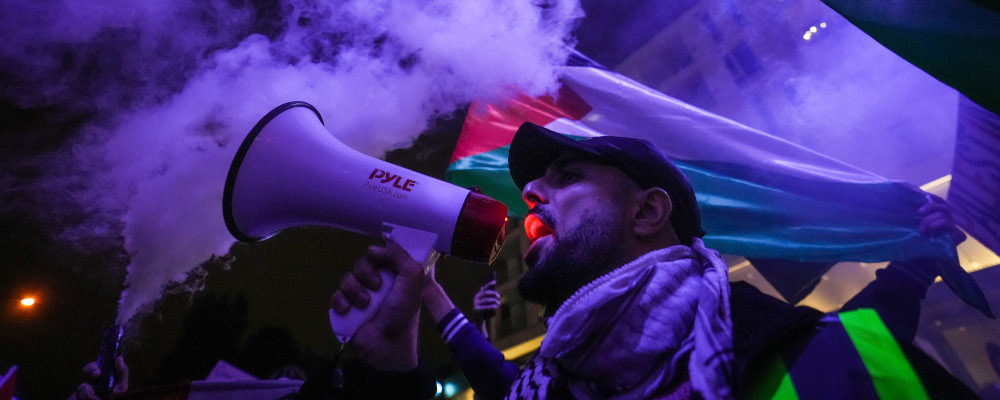In the latest Hub book review, Patrick Luciani revisits Orientalism by Edward W. Said (Pantheon Books, 1978) and highlights how his influential book and his activism helped lay the framework, intellectual and otherwise, for the unrest of our current moment.
After the initial shock of October 7, something snapped on Western campuses worldwide. Students who less than a decade ago were still in grade school, taking swimming lessons and going to each other’s birthday parties are now shouting the vilest antisemitic tropes.
Who’s to blame? Most go to the morally confused professors who can’t tell right from wrong. But there is also the influence of the late Columbia University Professor Edward Said and his book Orientalism.
Professor Said,pronounced Sy-eed who died in 2003, was held in high honour not only by Palestinians, as an American of Palestinian heritage, but also by American and European intellectuals. He earned his reputation as a brilliant polemicist and deep zealotry in defence of Palestinian rights.
In 1974, Edward Said wrote Yasser Arafat’s notorious speech to the National Assembly of the UN, where Arafat brandished a gun and olive branch, equating Zionism to racism. He also blamed Zionists for starting the 1948 war on the heels of a UN vote creating the State of Israel. Said continued to support Arafat until the Oslo Accords in 1995, furious that the PLO leader considered signing a peace agreement with Israel. Hamas sabotaged the Accords with a string of suicide bombings in Israel. This is what Said wanted: a war that would bring down the State of Israel and wreck forever the idea of a two-state solution. Now, Hamas hopes to destroy any rapprochement between Israel and Saudi Arabia or any other Arab country.
The publication of Orientalism in 1978 took Said to a higher level of fame and influence, winning the hearts and minds of the American Left. His thesis was that European and American scholars—called Orientalists—were to blame for the West’s misunderstanding and distortions of Arabs and Muslims as ignorant and backward. According to Said, every Westerner who studied the Middle East did so in bad faith.
This mythology worked its way into today’s truism—taught in classrooms everywhere—that Europeans were vicious oppressors taking advantage of “virtuous victims.” Said claims this attitude also shows up in Western art and literature. In the film Lawrence of Arabia, Said believes that all Arabs are portrayed by T.E. Lawrence, who is played by Peter O’Toole, as “a little people, a silly people, greedy, barbarous and cruel.” As a scholar of comparative literature, he found imperialism everywhere, even in the novels of Jane Austen.
On this point, Said was brutal in his accusation. “Every European, in what he could say about the Orient, was consequently a racist, [and] an imperialist.” Westerners are to blame for all the misfortunes of the Middle East, even if most are self-inflicted. “Orientalist” now falls into the category of a slur and is essentially banished from common use.
These claims are a grotesque exaggeration and an outrageous libel on many renowned scholars. Orientalists were hardly the monsters portrayed in Said’s imagination or what he calls the European “narrative” of the East. Princeton Professor Bernard Lewis, one of the great scholars of the Middle East, and a prime target of Said’s venom, has pointed out that Said conveniently ignores the pure racist attitudes of Soviet scholars against the Muslim world.
Edward Said had plenty of help in pushing his narrative, much in common with the likes of Sartre and Norman Mailer, who endorsed killing as the release to personal freedom from racism. Others on the sideline played along, including Noam Chomsky, Gore Vidal, and Michael Moore—all determined to show the West in the worst possible light.
But the real damage was in the universities starting in the late 60s and 70s, where the message of the corrupt West took hold among intellectual guilt-mongers who turned Said into their hero and champion. Said eagerly welcomed the return of theocrat Ayatollah Khomeini to Iran simply because it wasn’t Western. His thesis played well in humanities and social science, where scholars came of age after the tumultuous campus protests against the Vietnam War. They saw the world as a dichotomy between victims and victimizers nurtured by the teaching of French deconstruction thinkers who brought together the ideas of anti-colonialism and “critical thinking.”

Tenured scholars, raised on postmodernism and postcolonial studies, now dominate the academy and have quickly passed this new prejudice to their students. If colonialism is a sin, then colonizers must wiped out. One can read it no other way. How else to explain the joy expressed by a Cornell University historian who felt “exhilarated” on hearing of Hamas’s butchery or the jubilation experienced at the murderous rampage by one University of Toronto professor?
Since the publication of Orientalism, Edward Said’s “narrative” has been thoroughly discredited as “malignant charlatanry.” But the damage has been done. After 50 years of indoctrination of the evils of the West, Said’s work left the inevitable conclusion that violence is the only answer for Palestinians: a lesson not lost on young protestors throughout North America, Britain, and Australia.
How is it that the antisemitism of some of our teachers and many of their students is such that they seem completely indifferent to the slaughter of infants and the innocent —or worse still believe that it never happened? They are Said’s legacy: their hatred, his gift to the future.
Recommended for You

‘Our role is to ask uncomfortable questions’: The Full Press on why transgender issues are the third rail of Canadian journalism

Need to Know: Mark Carney’s digital services tax disaster

Theo Argitis: Carney is dismantling Trudeau’s tax legacy. How will he pay for his plan?

Kirk LaPointe: B.C.’s ferry fiasco is a perfectly Canadian controversy




